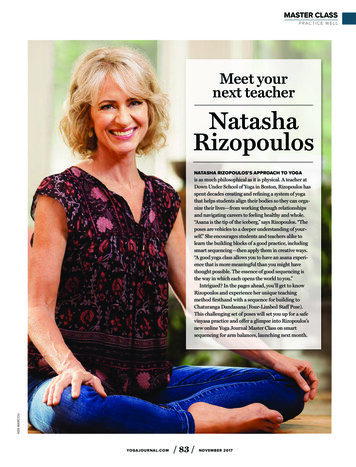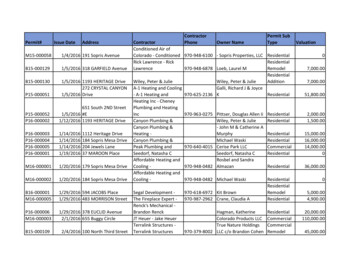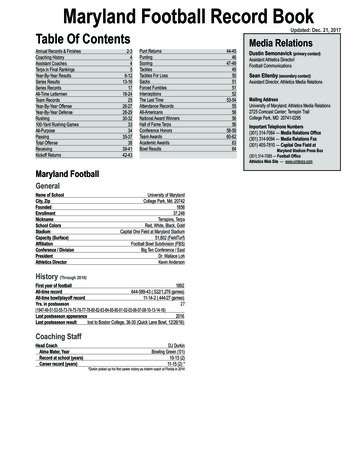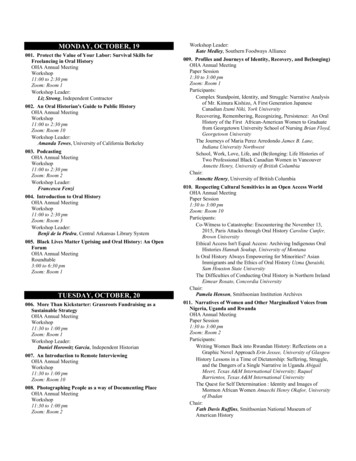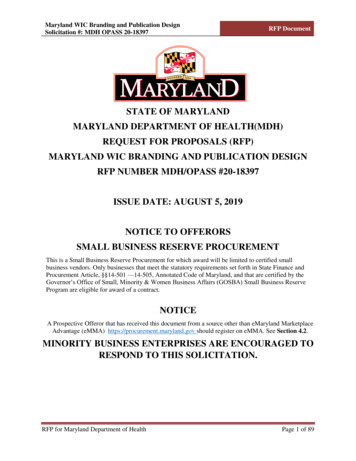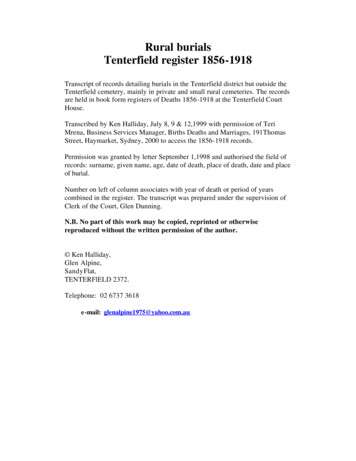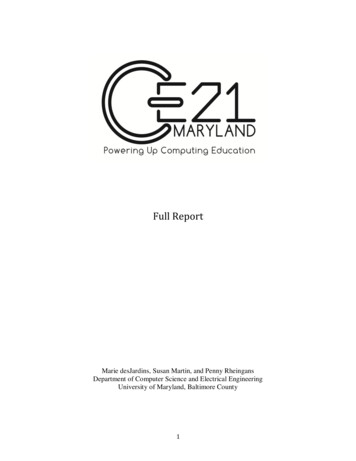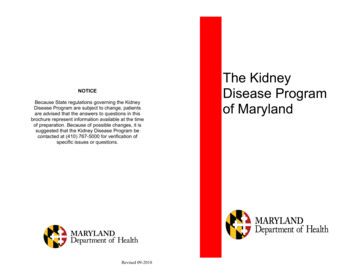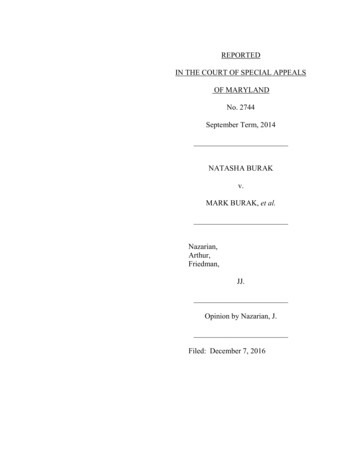
Transcription
REPORTEDIN THE COURT OF SPECIAL APPEALSOF MARYLANDNo. 2744September Term, 2014NATASHA BURAKv.MARK BURAK, et al.Nazarian,Arthur,Friedman,JJ.Opinion by Nazarian, J.Filed: December 7, 2016
After a five-day custody merits hearing, the Circuit Court for Montgomery Countygranted physical and legal custody of the sole minor child (“Child”) of Natasha Burak(“Wife”) and Mark Burak (“Husband”) to Husband’s parents (individually, “Grandfather”and “Grandmother,” and, collectively, the “Grandparents”). After a merits hearing relatingto property distribution, the circuit court determined that money the Grandparents hadcontributed toward the purchase of Wife and Husband’s marital home was a giftconditioned on Husband and Wife’s continued marriage and use of the home, for the solebenefit of the Child, and because the divorce violated that condition, the Grandparents wereentitled to recover those funds. After a child support hearing, the court ordered Husbandand Wife to pay child support to the Grandparents. Wife challenges all of these decisions;Husband does not, and apparently has decided to align his interests with his parents’. Wedismiss one of Wife’s challenges for failure to provide a transcript, reverse the judgmentin favor of the Grandparents as to the marital home proceeds, and otherwise affirm.I. BACKGROUNDHusband and Wife were married on October 7, 2006, and Child was born on June24, 2008. Husband testified at the custody hearing that one week before the wedding, Wifetold him that she had been diagnosed with multiple personality disorder. 1 On June 20,2011, Husband and Wife, using 131,000 from the Grandparents as a down payment,purchased a 355,000 home in Silver Spring.1Although several witnesses testified that Wife displayed multiple personalities during themarriage, the record does not clearly establish whether she actually had such a disorder.
During the marriage, Husband and Wife were involved in a polyamorousrelationship with a woman we’ll call M.2 Husband and Wife met M in late 2008 when theyall lived in the same apartment building. Husband testified that about two weeks aftermeeting M, he and Wife talked to her about beginning a sexual relationship with her. Mtestified that as part of this discussion, Wife told her that she had dissociative identitydisorder or multiple personality disorder.Wife, however, testified that the sexualrelationship with M started “[b]y [Husband] introducing it.” Husband, Wife, and M met“[a] couple . . . to a handful [of] times a month” until M moved into the family home in2012.From September 2012 through February 2013, Husband, Wife, and M participatedin counseling because Husband wanted M to stay in the house while Wife wanted M toleave. The sexual relationship between M and Wife had ended in December 2012. Wifetestified at the custody hearing that she felt coerced by Husband, but offered no otherevidence that Husband was coercing or influencing her to have a relationship with M.Husband and M testified that Husband never forced Wife to have a sexual relationship withM.During their marriage, Husband and Wife smoked marijuana and used several otherdrugs together and with M. They scheduled their drug use to allow Husband and Wife to2Wife also had a long-term sexual relationship with another man during the marriage. Wehave hesitated somewhat to include these details, since the divorce itself is uncontested.Ultimately, though, as we explain later, the chaos and instability of Child’s homeenvironment mattered to the custody decision (although not the parents’ sexual preferencesor orientations), and we need to paint an accurate picture of his circumstances.2
coordinate care for the Child by the Grandparents at the Grandparents’ home. Thesesessions occurred “[a]nywhere from every other weekend to once a month, to sometimesit would be a few months.” Wife testified that she only used drugs at Husband’s insistence,but offered no other evidence that Husband “coerced” or “influenced” her. Wife kept acalendar that indicated when she was “tripping.” Both Husband and M testified that Wifewas never forced to use drugs, and Husband testified that it was Wife’s idea that they usecocaine.A.The GrandparentsThe Grandparents are both retired and live in a home with a room for Child. TheGrandparents have been “heavily involved” in Child’s life—Child spent many weekendsand a significant amount of weekday time with the Grandparents, including when hisparents were using drugs. As an infant, Child spent three days each week and occasionalweekends at the Grandparents’ home. When he was older, Child spent two to four days ornights per week at the Grandparents’ home. Husband also testified that Wife asked thatChild go to the Grandparents’ when she would otherwise be left alone with him and thatthis “became more routine” during their marriage.In addition, the Grandparents frequently took Child to the doctor and the dentist sothat Husband and Wife would not have to take time off from work, and they arranged forChild to attend school programs and recreational activities. The Grandparents took Childto church on Sundays when he was with them. According to Wife’s testimony, theGrandparents “[ha]ve tried to act as parents” to Child.3
B.Husband And Wife’s SeparationHusband and Wife’s relationship became strained in 2012 as a result of frequentfights that included profane name-calling and screaming at each other. Both Husband andWife testified about incidents leading to their separation. Wife testified that Husbandbecame physically violent and threatened to kill her during a trip to King’s Dominion withM. Husband countered that he hit Wife because she intentionally slammed his arm withthe car door and that he did not ever threaten to kill her in front of Child.On May 30, 2013, after these incidents, Husband and Wife separated and Wifesought and received a protective order against Husband. While the restraining order wasin effect, Wife voluntarily arranged visitation with the Grandparents so that Husband couldsee Child on a weekly basis under the Grandparents’ supervision.After the separation, Wife stayed in the marital home with Child, and they livedwith two different men shortly after the separation. From early July 2014 until at least thetime of the custody hearing (which began on September 15, 2014), Wife and Child livedwith Wife’s daughter, Wife’s daughter’s adoptive mother, father, and older sister (the“Ks”), four dogs, and twenty guinea pigs. The Ks did not contribute toward the mortgageor household expenses during the time that they lived in the marital home.On July 11, 2013, Wife filed a Complaint for Absolute Divorce that sought solephysical and legal custody of Child, child support, and other relief.3 Husband filed acounter-complaint on August 27, 2013 that requested, among other things, an absolute3Wife filed a First Amended Complaint for Absolute Divorce on July 9, 2014, and thecircuit court entered an Order and Judgment of Absolute Divorce on January 23, 2015.4
divorce, custody of Child, and child support. They reached a pendente lite settlement thatprovided, among other things, that Wife would have physical custody of Child, Husbandwould have visitation with Child under the supervision of the Grandparents and continuepaying monthly child support to Wife in the amount of 500, and both Husband and Wifewould be subject to random drug testing. Husband paid child support on time until August2014.C.The Grandparents’ Motion For Permissive InterventionOn April 24, 2014, the Grandparents filed a Motion for Permissive Interventionrelating to Child’s legal and residential custody and a Complaint for Custody. On May 21,2014, Wife filed a Motion to Strike both. The trial court granted the Grandparents’ Motionfor Permissive Intervention on July 14, 2014.D.Child’s Crisis Center ReferralAround May 2014, Child began exhibiting behavior issues at school. He becameupset, refused to leave the classroom, and pushed desks. Child’s behavioral issuescontinued during summer camp, around the same time that the Ks moved into the maritalhome with Wife and Child.During the early part of the 2014 school year, Child became frustrated and angryand sometimes left his classroom and the school building. In one instance on September4, 2014, Child hit and kicked the assistant principal and told the school counselor andassistant principal that he was so angry that he wanted to blow up the school. BothGrandmother and Wife arrived at the school after this incident; Grandmother had beenscheduled to pick up Child for his visitation with Husband, and the school had called Wife.5
The principal spoke to Wife about the situation in a conference room while Grandmothersat outside because Wife did not want the principal to speak with Grandmother.The principal advised Wife that the school was referring Child to the MontgomeryCounty Crisis Center (the “Crisis Center”), and strongly encouraged Wife to take Childthere. The principal also informed Wife that the school guidance counselor had the CrisisCenter referral paperwork. When the principal finished talking to Wife, Child left withGrandmother and Wife met with the guidance counselor. The guidance counselor gaveWife the form referring Child to the Crisis Center and told her to take Child as soon as shecould, although Child could return to school even if the Crisis Center had not completedthe referral form.Husband’s attorney—not Wife or the personnel from the school—informedHusband about the Crisis Center referral. Husband called Grandmother and learned thatGrandmother had picked up Child and that Wife had not taken Child to the Crisis Center.Husband called his attorney to determine what he should do with Child, and his attorneytold him to take Child to the Crisis Center. Within forty-five minutes of learning about thereferral, Husband and Grandmother took Child to the Crisis Center.4 Wife, meanwhile,attended Child’s back-to-school night. After the incident, Wife never returned the form4Wife testified that she took Child to the Crisis Center, which referred Child to a children’shospital, and that she also took Child to the children’s hospital. The on-call therapist at theCrisis Center, however, testified that Child was not brought into the Crisis Center morethan once on September 4 and that a referral to the closest emergency room, not a children’shospital, would follow the Crisis Center’s protocol.6
she received from the guidance counselor to the school, and she kept Child at home forseveral days after the incident.After the incident, Child began receiving therapy through his school. Wife alsotestified that, although Child did not receive additional individual counseling, she did seekcounseling for him.E.Child Custody Merits HearingOn the first day of the custody hearing, Wife’s counsel called the Court Evaluatorto testify about her February 20, 2014 oral report.5 The Court Evaluator testified aboutHusband’s drug use and expressed concern about Husband’s alleged history of sexuallyabusing children, including his sister and daughter from an earlier marriage. The CourtEvaluator testified that she had concluded in her oral report “[t]hat it was unlikely[Husband and Wife] would be able to successfully cooperate and communicate” andrecommended that Wife have primary residential and sole legal custody of Child.During cross-examination, the Court Evaluator explained that she recommendedthat Wife have custody of Child because she “felt [Wife] at least expressed the desire tohave primary custody and she was in therapy.” The Court Evaluator testified that Wifelied to her about “the drug test results, because she told [the Court Evaluator] that she had5On September 27, 2013, Wife had filed a Motion for Custody Evaluation Performed bythe Court and the circuit court granted the motion on December 17, 2013. The CourtEvaluator appeared and presented her findings and recommendation on February 20, 2014.The transcript of the Court Evaluator’s oral report and recommendation, however, was notreceived into evidence at the custody merits hearing.7
not used marijuana since . . . the parents separated. And she did test positive for marijuana[after the pendente lite hearing on January 14, 2014].”The Evaluator also testified about the Grandparents’ relationship with Child, sayingthat they were “very important in [Child]’s life,” were “intimately involved in a lot of thedetails of [Child]’s . . . life,” and “had excellent accommodations for [Child] in their home.”The Evaluator also expressed “serious concerns” about both Husband’s and Wife’sjudgment:[B]oth [Husband and Wife], and the grandparents, and others,told me about ways in which both parents relied on thegrandparents when they were . . . with [M], when they werehaving arguments, when they were using drugs together, theyoften told me, but [Child] wasn’t adversely affected, becausehe was with his grandparents. He was with them almost everyother weekend, although not on a regular set schedule. Andother times the[ Grandparents] were going to the school. Theywere chaperoning and volunteering at the school. They werealmost functioning as the parents.The Evaluator expressed two further concerns: “that [she] didn’t see . . . more signs ofattachment and bonding between [Child] and either parent,” and that either or both parentswould use drugs again. The Evaluator also felt that Child’s bond with the Grandparentsmatched the bond he had with his parents.At trial, Wife testified about how she cared for Child during the time between thependente lite hearing and the custody merits hearing.6 During her cross-examination, Wifetestified about a calendar containing “everything that was going on . . . at that time [2013],”6Wife’s recent therapist testified briefly and stated that Wife sometimes sought parentingadvice during their sessions.8
including notations regarding her drug usage and sexual relations with M, Husband, andanother man, but claimed that she could not remember the meaning of her notations on thecalendar. Wife also could not remember any specific threats Husband made against her.When Husband’s counsel asked Wife about emails she had written in which shereferred to her alternate personalities, Wife responded that she was unsure if she wrotethem “because [Husband] had access to the e-mail account,” but that if she did write them,that she would have referred to herself in the third person. In response to questions fromthe Grandparents’ attorney, Wife testified that Grandmother would not “purposely” letharm come to Child or neglect him, but that she had concerns about the Grandparents’ability to care for Child; she could not, however, “describe anything that may or may notbe there” because she was “not made aware of what happens when [Child]’s [at theGrandparents’] for visitation.” With regard to her drug use at the time of the custody meritshearing, Wife originally answered the judge’s question by saying that she was not cleanfrom drugs, but quickly changed her answer to say that she was.Husband testified about his relationships with Wife and Child. He testified that hehad tested negative for each of the administered drug tests and did not plan to use drugs inthe future. He expressed concern about Wife’s ability to care for Child and cited Child’srecent behavioral issues and the Crisis Center referral. And Husband offered his belief thatWife was not fit and proper to have custody of Child, but that the Grandparents were.M testified about her relationship with Husband and Wife. According to M, Wifewas capable of becoming violent or aggressive toward Child:9
It would be some occasional times during the, usually weekendmornings, where I would wake up and I would see [Wife]either yelling at [Child] or screaming, or whatever. And itdidn’t seem like it was such a big deal. It might have beenover, like, a yogurt or going outside, or forgetting to, you know,throw recycling away. I mean, a mountain out of a molehill itseemed to be. And I would ask about it later, and [Wife] wouldtell me, well that, that was Morgan[, one of Wife’s alternatepersonalities,] and Morgan was just starting to get reallyfrustrated with him.M recounted that Wife and Child “get very frustrated with each other very easily” and thatWife did not like to care for Child alone. When asked whether Wife should have custodyof Child, M said no:I don’t believe that [Wife] can fully take care of herself, forstarters. I have seen a marked difference in [Child]’s mood andbehavior. I know that he was supposed to be in therapy, andthat he’s not. I know that the school’s had to call in for, he’sbeen sent to Crisis Center. I, I’m, I’m concerned about him. Idon’t think that the, the family, there’s a family now that’sliving with them. And I [k]now some about that family andtheir lifestyle and the cleanliness and lack of cleanliness andthe hoarding lifestyle that they’ve brought with them. I just, I,I don’t think it’s appropriate.In contrast, M answered that she believed that the Grandparents were the fit and properpeople to have full custody of Child because “[t]hey have the time, they have the patience,they have the home that he’s been living in about half, half the time for most of his life.They know his medical history. They’ve been to his school functions. I mean they, they,they were in it sometimes more often than the parents were.”Grandfather testified about his relationship with Child, and explained that he andGrandmother were seeking custody because they “ha[d] very grave concerns about theability of either [Husband] or [Wife] to bring up [Child] in a environment that will provide10
for him the opportunities that a six year old deserves. . . . [W]e have to rescue him from alot of the behaviors that have been described.” Grandfather expressed the belief that itwould be in Child’s best interests to be in the Grandparents’ primary care and that bothGrandparents were fit and proper persons to have custody of Child. Grandfather opined aswell that Child’s behavior would improve if he was removed from Wife’s custody.Grandmother also expressed that she and Grandfather were fit and proper personsto have custody of Child for several reasons:Well, first of all, we love [Child] very, very much. And secondof all, the preponderance of testimony in this courtroom today,much of which we were unaware, has made us firmly believethat neither [Wife] nor [Husband] is prepared financially,socially, morally, to raise [Child] in a[n] environment that willhelp to be the person that he has the potential to be.[Grandfather] and I are caretakers. [Grandfather]’s father wasbedridden for 18 and a half years. The first 18 and a half yearsof our marriage, we drove every third weekend to New Jerseyto help his mother care for his father at home. It mattered notwhat was going on, what invitation we had, what party wasgoing on, we went.We’ve cared for [Grandfather]’s mother in our home,simultaneously with [Child]. She had a litany of ailments . . . .But we felt that it was an important thing for us to do. We areboth caregivers.Grandmother also expressed concern about Child’s social development if Wife weregranted custody, about Wife’s ability to care for Child alone for long periods of time, andabout Wife’s handling of the Crisis Center referral.Other non-family witnesses also offered observations. The Grandparents’ next-doorneighbor testified that the Grandparents’ relationship with Child was more like a parent’srelationship than a grandparent’s, and she too opined that the Grandparents would be fit11
and proper persons to have custody of Child. Same for a member of Grandparents’ church.Child’s school principal and guidance counselor testified about Child’s behavior at school,including the September 4, 2014 Crisis Center referral incident. Husband also called aclinical psychologist who had counseled Husband, Wife, and M and she testified about theemotional amplitude of the unconventional relationship, which included yelling, arguingloudly, and “going at it in a volatile manner.”At the conclusion of the five-day custody trial, on September 19, 2014, the court, inan oral ruling, granted physical and legal custody of Child to the Grandparents.F.Interim OrdersThe court followed its oral custody ruling with an interim order dated September24, 2014 restating its finding that “neither [Wife] nor [Husband is] fit and proper to havecustody of the minor child” and the presence of “extraordinary circumstances . . . that aresignificantly detrimental to the minor child if the child were to remain in the custody of[Wife].” In addition, the court found “that it [wa]s in the best interest of [Child] to awardsole custody to the [Grandparents]” and “that the [Grandparents] are fit and proper personsto have custody of [Child].”On October 7, 2014, the Grandparents filed an Emergency Motion to Modify andLimit [Wife]’s Access to Minor Child. After a hearing on the motion, the court, in a secondinterim order, granted the Motion and prohibited overnight visits with Wife.In a perhaps optimistically titled Final Order dated November 25, 2014, the court,among other things, ordered Wife to pay Husband “ 9,628.38 as compensation for his halfof the expenses he paid towards the maintenance of the family home from November 201312
through October 2014.”On December 24, 2014, Wife filed a Motion for PartialReconsideration of the Final Order and Motion for Expenses She Paid on [Husband]’sBehalf Towards the Maintenance of the Family Home, and the court denied that motion onJune 15, 2015.G.The Grandparents’ Motion For Child SupportIn the meantime, the Grandparents filed a Motion for Child Support. A magistrateheld a hearing on March 11, 2015 and, on March 24, 2015, recommended that the circuitcourt grant the motion. On April 2, 2015, Wife filed exceptions to the recommendation,arguing, among other things, that the child support award was grossly excessive because itrequired Wife to pay nearly half of her gross salary and because the Grandparents are“extraordinarily wealthy.” The circuit court granted Grandparents’ Motion for ChildSupport in an order dated May 19, 2015 and denied Wife’s exceptions in an order datedMay 21, 2015.H.Property Distribution HearingOver Wife’s objection, the court permitted the Grandparents to intervene in theproperty distribution hearing. At the end of the hearing, the court granted Husband andWife an absolute divorce and incorporated (but didn’t merge) their voluntary separationand property settlement agreement, and entered an order to that effect on January 23, 2015.The court also found that the Grandparents were entitled to the first 131,000 of theproceeds from the sale of the marital home because they made a conditional loan of thatamount to Husband and Wife for the purpose of allowing Child to grow up in a safe andclean home environment. The court entered an order to this effect on January 27, 2015.13
Wife filed a Motion for Partial Reconsideration on December 24, 2014, which theGrandparents opposed on January 7, 2015. The court took Wife’s Motion for PartialReconsideration under advisement on January 20, 2015, and later denied it.Wife filed a timely appeal. We will discuss additional facts below as necessary.II. DISCUSSIONWife presents eight questions on appeal7 that we have consolidated into five. First,Wife asserts that the court violated her “fundamental parental rights” under the United7Wife stated the Questions Presented in her brief as follows:1. Whether, despite the words used by the trial judge, did heactually apply the correct standard in awarding physicaland legal custody of the minor child to appellee third partygrandparents or did he violate Appellant’s constitutionalparental rights?2. Whether the trial judge violated Appellant’s and the minorchild’s due process rights in proceeding to trial on theAppellee Third Party’s complaint one month after it wasentered, without notice of any applicable allegations,without discovery and before any psychological or otherexpert assessment of the minor child could be performed?3. Whether “exceptional circumstances” or parental unfitnesscould be found in circumstances such as this, includingwhere Child Welfare Services, a court ordered custodyevaluator and a court ordered psychologist found theappellant was fit and had no disorders, and the custodyevaluator had recommended that the appellant be awardedcustody?4. Whether the trial judge otherwise abused his discretion inhis application of the evidence or whether he exhibited biasin a comparison of the Appellee Grandparents to theAppellant mother?14
States and Maryland Constitutions when it granted custody of Child to the Grandparentsand abused its discretion by denying her request for a continuance. Second, Wife assertsthat the court abused its discretion by soliciting expert testimony during a hearing in an“unorthodox manner” and, third, by permitting the Grandparents to intervene in the divorceproperty distribution hearing. Fourth, Wife argues that the court erred in awarding5. Whether the Appellant’s constitutional due process andparental rights were violated, and whether he abused hisdiscretion, when the trial judge severely limited theAppellant’s visitation with the minor child after taking“testimony” in an unorthodox manner of personallyquestioning the expert, who was not a sworn witness andstood in the back of the room, while not permitting crossexamination or further review?6. Whether the trial judge had jurisdiction or abused hisdiscretion in permitting the Appellee Third Partygrandparents to intervene in the divorce propertydistribution hearing for “judicial convenience” when theAppellant has a right to a jury trial on this claim, it is notpermitted in the family law statute or procedure, andwithout the Appellee Third Party filing a motion, providingnotice, providing discovery, or filing a cause of action, andwhether the trial judge’s conclusions were based on theactual evidence?7. Whether the trial judge’s order addressing the 9,628.38 in“contributions” made towards maintenance of the familyhome properly considered and applied the claims made byboth parties?8. Whether the order of child support, payable to the AppelleeGrandparents, was in accordance with the appropriate childsupport provisions that did not take into account the wealthof the custodial grandparents?15
Husband ‘“contributions made towards maintenance of the family home.” And finally,Wife challenges the order requiring her to pay child support to the Grandparents.We review child custody determinations using three interrelated standards ofreview:When the appellate court scrutinizes factual findings, theclearly erroneous standard of [Rule 8–131(c)] applies.[Second], if it appears that the [court] erred as to matters oflaw, further proceedings in the trial court will ordinarily berequired unless the error is determined to be harmless. Finally,when the appellate court views the ultimate conclusion of the[court] founded upon sound legal principles and based uponfactual findings that are not clearly erroneous, the [court’s]decision should be disturbed only if there has been a clearabuse of discretion.In re Yve S., 373 Md. 551, 586 (2003). We give “due regard . . . to the opportunity of thelower court to judge the credibility of the witnesses.” Id. at 584. And we recognize thatthe trial court is vested broad discretion in making custody determinations:[I]t is within the sound discretion of the [trial court] to awardcustody according to the exigencies of each case, and . . . areviewing court may interfere with such a determination onlyon a clear showing of abuse of that discretion. Such broaddiscretion is vested in the [trial court judge] because only hesees the witnesses and the parties, hears the testimony, and hasthe opportunity to speak with the child; he is in a far betterposition than is an appellate court, which has only a cold recordbefore it, to weigh the evidence and determine what dispositionwill best promote the welfare of the minor.”Id. at 585–86.“If there is any competent evidence to support the factual findings below, thosefindings cannot be held to be clearly erroneous.” Fuge v. Fuge, 146 Md. App. 142, 180(2002). An abuse of discretion occurs “where no reasonable person would take the view16
adopted by the [trial] court, or when the court acts without reference to any guiding rulesor principles.” In re Adoption/Guardianship No. 3598, 347 Md. 295, 312 (1997) (citationsand internal quotation marks omitted). “An abuse of discretion may also be found wherethe ruling under consideration is clearly against the logic and effect of facts and inferencesbefore the court, or when the ruling is violative of fact and logic.” Id. (citations and internalquotation marks omitted). However, “where the [custody] order involves an interpretationand application of Maryland statutory and case law, our Court must determine whether the[circuit] court’s conclusions are ‘legally correct’ under a de novo standard of review.”Walter v. Gunter, 367 Md. 386, 391–92 (2002).A.The Circuit Court Neither Violated Wife’s Constitutional RightsNor Abused Its Discretion By Awarding The Grandparents SoleLegal and Physical Custody.The overriding goal in determining child custody is to serve the best interests of thechild. Conover v. Conover, 450 Md. 51, 60 (2016) (citing Taylor v. Taylor, 306 Md. 290,303 (1986) (“We emphasize that in any child custody case, the paramount concern is thebest interest of the child . . . . The best interest of the child is [] not considered as one ofmany factors, but as the objective to which virtually all other factors speak.”); Ross v.Hoffman, 280 Md. 172, 174–75 (1977) (asserting that the “best interest standard is firmlyentrenched in Maryland and is deemed to be of transcendent importance”)). At the sametime, “[i]t is also well-established that the rights of parents to direct and govern the care,custody, and control
On July 11, 2013, Wife filed a Complaint for Absolute Divorce that sought sole physical and legal custody of Child, child support, and other relief.3 Husband filed a counter-complaint on August 27, 2013 that requested, among other things, an absolute 3 Wife filed a First Amended Complaint for Absolute Divorce on July 9, 2014, and the
